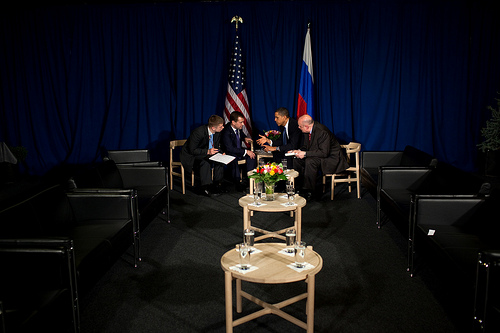In a classic case of misdirection, while the media are preoccupied with the fate of the Bush tax cuts, President Obama is preparing to attend a United Nations summit next week to endorse “innovative finance mechanisms”—global taxes—to drain even more wealth out of the U.S. economy.
A draft “outcome document” produced in advance of the September 20-22 U.N. Summit on the Millennium Development Goals (MDGs) commits the nations of the world to supporting “innovative financing mechanisms” to supplement foreign aid spending.
The term “innovative financing mechanisms” is a U.N. euphemism for global taxes. But the document actually goes further, praising the “Task Force on International Financial Transactions for Development” for its work on the subject of mobilizing additional “resources” for countries to achieve the MDGs. This is a body tasked with proposing and implementing global tax schemes.
“We consider,” the document says, “that innovative financing mechanisms can make a positive contribution in assisting developing countries to mobilize additional resources for financing for development on a voluntary basis. Such financing should supplement and not be a substitute for traditional sources of financing.”
In other words, the revenue from global taxes should be in addition to foreign aid spending.
The document recognized the “considerable progress” made in this area, an acknowledgement that an international tax by some nations on airline tickets is already in effect and producing several billions of dollars of revenue for world organizations to fight AIDS and other diseases.
In an article in The Christian Science Monitor, under the headline, “Small global taxes would make a big difference for world’s ‘bottom billion,’” the foreign minister of France and other officials of foreign nations endorse various forms of “innovative development financing.” One of their proposals is a tax on international currency transactions that could generate $35 billion a year.
The proposal, popular at the United Nations for decades and long-advocated by Fidel Castro, is called the Tobin Tax and named after Yale University economist James Tobin. Steven Solomon, a former staff reporter at Forbes, said in his book, The Confidence Game, that such a proposal “might net some $13 trillion a year…” because it is based on taking a percentage of money from the trillions of dollars exchanged daily in global financial markets.
He is referring to the fact that once such a tax is in place, it could be easily raised to bring in hundreds of billions of dollars or more a year to the U.N. and other global institutions.
Such financial transactions through banks and other financial institutions are commonplace on behalf of Americans who have stock in mutual funds or companies that invest or operate overseas. Hence, such a global tax could affect the stocks, mutual funds, and pensions of ordinary Americans.
The term “small global taxes” brought a stunned reaction from Senator David Vitter, when he was told of what is being proposed in advance of the U.N. summit. Vitter introduced Senate resolution 461, “Expressing the sense of the Senate that Congress should reject any proposal for the creation of a system of global taxation and regulation,” to put the Senate on record against any such measure. He has vowed to maintain pressure on the world body to avoid implementing any of these schemes and thinks that the Congress has to use whatever financial leverage it has to frustrate U.N. demands for more power and authority in world affairs.
The Vitter resolution was sent to the liberal-controlled Senate Finance Committee, which declined to act on it.
Obama has been a major U.N. supporter since he was in the Senate and sponsored a bill, the Global Poverty Act (S 2433), to force U.S. compliance with the MDGs. Joseph Biden, then chairman of the Senate Foreign Relations Committee, tried to get it passed into law but ultimately failed.
As President, Obama is in a position to actively promote global taxation measures and clearly has done so. The “outcome document” his administration has already endorsed will be formally approved at next week’s summit.
The document affirms the so-called “Monterrey Consensus” that committed nations to spending 0.7 percent of Gross National Product (GNP) on official development assistance (ODA), otherwise known as foreign aid. It says that “The fulfillment of all ODA commitments is crucial, including the commitments by many developed countries to achieve the target of 0.7 percent of gross national product (GNP) for ODA to developing countries by 2015…”
Over a 13-year period, from 2002, when the U.N.’s Financing for Development conference was held, to the target year of 2015, when the U.S. is expected to meet the Millennium Development Goals, this amounts to $845 billion from the U.S. alone, according to Jeffrey Sachs of the U.N.’s Millennium Project.
“We have fully embraced the Millennium Development Goals,” Obama told the U.N. in 2009.
Cliff Kincaid is the Editor of Accuracy in Media, and may be contacted cliff.kincaid@aim.org.
Graphic images added by Gulag Bound










Send this to Newt. He is currently being pilloried by the left for agreeing with the premise of Dnesh Dsousa’s article which in essence says that Obama has adopted his father’s Kenyan anticolonialist view of the world. Pushing for a world tax on developed countries (read “colonial powers”) seems further proof of this thesis.
If anyone had doubts about Agenda 21 being real or not; or that we were actually doing it, need only look at the “outcome document” you have linked in this article. Obama is about to fully and officialy commit the United States to the global constitution that is Agenda 21. THEY SAY IT IN THE DOCUMENT.
*PAGE 24*
“Millennium Development Goal 7
Ensure environmental sustainability
77. We commit ourselves to accelerating progress in order to achieve Millennium Development Goal 7,including through:
(a) Pursuing sustainable development,****in accordance with the principles contained in the Rio Declaration on Environment and Development, including the Report of the United Nations Conference on Environment and Development, Rio de Janeiro****, principle of common but differentiated responsibilities,and taking into account the respective capabilities of countries,with a view to effectively implementing the outcomes of the major summits on sustainable development and addressing new and emerging challenges”
And it goes on and on. This is not debatable; this is real, they are saying it out loud for anyone who is listening to hear, and its going down in a matter of days.